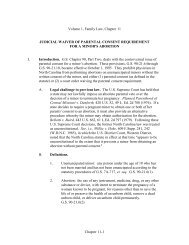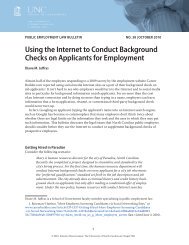Immunizations for Children and Adolescents - School of Government ...
Immunizations for Children and Adolescents - School of Government ...
Immunizations for Children and Adolescents - School of Government ...
You also want an ePaper? Increase the reach of your titles
YUMPU automatically turns print PDFs into web optimized ePapers that Google loves.
10 UNC <strong>School</strong> <strong>of</strong> <strong>Government</strong> Health Law Bulletin<br />
Confidentiality <strong>of</strong> Immunization In<strong>for</strong>mation<br />
25. Is immunization in<strong>for</strong>mation confidential?<br />
Yes. Individually identifiable health in<strong>for</strong>mation—including in<strong>for</strong>mation about immunizations—<br />
is confidential under both North Carolina law <strong>and</strong> the federal Health Insurance Portability <strong>and</strong><br />
Accountability Act <strong>of</strong> 1996 (HIPAA) privacy rule (<strong>for</strong> health care providers <strong>and</strong> others who are<br />
“covered entities” under that rule).<br />
In<strong>for</strong>mation about a child’s immunizations may be disclosed only when the applicable confidentiality<br />
laws permit the disclosure. A full review <strong>of</strong> those laws is beyond the scope <strong>of</strong> this bulletin.<br />
The remainder <strong>of</strong> this section addresses some <strong>of</strong> the most frequently asked questions about<br />
disclosing immunization in<strong>for</strong>mation, but it does not provide a comprehensive treatment <strong>of</strong><br />
every question that may arise. Providers should seek an attorney’s advice if they have questions<br />
about disclosures not addressed by these provisions, or specific questions about the application<br />
<strong>of</strong> these provisions.<br />
26. Must a health care provider obtain a written release<br />
(or authorization) be<strong>for</strong>e disclosing immunization in<strong>for</strong>mation?<br />
Sometimes, but not always. Written permission to disclose in<strong>for</strong>mation is required unless a particular<br />
provision <strong>of</strong> law allows disclosure <strong>of</strong> the in<strong>for</strong>mation without it.<br />
The general rule is that health in<strong>for</strong>mation created or obtained by health care providers may<br />
not be disclosed without the permission <strong>of</strong> either the patient or, if the patient cannot make his<br />
or her own health care decisions, the patient’s personal representative. 47 The HIPAA privacy<br />
rule uses the term “authorization” to describe the permission that is required. To comply with<br />
HIPAA, an authorization must be in writing <strong>and</strong> must include particular elements spelled out in<br />
the privacy rule. 48<br />
Under the general rule, the starting assumption is always that in<strong>for</strong>mation may be released<br />
with authorization—but that does not mean that authorization is always required. There are a<br />
number <strong>of</strong> exceptions to the general rule, two <strong>of</strong> which are particularly relevant to the release <strong>of</strong><br />
immunization in<strong>for</strong>mation.<br />
• The “required by law” exception. When disclosure <strong>of</strong> in<strong>for</strong>mation is required by law,<br />
authorization is not required. 49<br />
• The “public health purposes” exception. When in<strong>for</strong>mation is disclosed to a public<br />
health agency or <strong>of</strong>ficial that is authorized by law to collect the in<strong>for</strong>mation <strong>for</strong><br />
certain public health purposes (including preventing or controlling disease <strong>and</strong><br />
conducting public health surveillance), authorization is not required. 50<br />
.org/pro/pdf/RefusaltoVaccinate.pdf (accessed July 20, 2009).<br />
47. 45 C.F.R. 164.508(a)(1) (establishing the general rule that written authorization is required);<br />
164.502(g) (defining the role <strong>of</strong> personal representatives). A full discussion <strong>of</strong> personal representatives<br />
is beyond the scope <strong>of</strong> this bulletin. In most cases, the personal representative <strong>for</strong> a minor child<br />
is the child’s parent, guardian, or person st<strong>and</strong>ing in loco parentis. For more in<strong>for</strong>mation about who<br />
may authorize the disclosure <strong>of</strong> a minor’s health in<strong>for</strong>mation, see www.sog.unc.edu/programs/ncphl/<br />
ReqsForConfMedInfo/Disclosing%20Minors.pdf.<br />
48. 45 C.F.R. 164.508(c).<br />
49. 45 C.F.R. 164.512(a).<br />
50. 45 C.F.R. 164.512(b).













